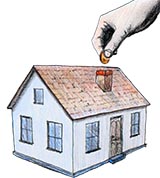
Make me rich
My Home is my Fort Knox
Intuitively, homeownership and wealth seem to go hand-in-hand. Homeowners are wealthier than renters, say. And they keep enlarging their wealth through the regular schedule of mortgage repayment, which builds home equity. The resulting enforced discipline makes them set a bit of their income apart for old age, and encourages the community spirit.
Small wonder, then, that many countries, including the United States, have over the years fostered homeownership by subsidising mortgages, providing tax rebates or other means. Some 66% of US homes house an owner-occupant. In places such as Italy and Spain, the rates are even higher, at between 73% and 78%.
And yet there are some very rich places, such as Switzerland, Hong Kong, Germany and Austria where homeownership rates are far lower, ranging from 44% to 57%, while other poorish countries such as Romania or Lithuania boast rates well above 90%. Does homeownership really have something to do with wealth accumulation? CESifo Fellow Leo Kaas and his colleagues Georgi Kocharkov and Edgar Preugschat took a closer look into the issue, which has gained increasing urgency after the subprime mortgage crisis in the US, and summarised their findings in their latest CESifo Working Paper.
It turns out that it is not so easy to find an answer. Homeownership can be related to many other factors that make it difficult to isolate the pure effect of owning a home on the wealth of the owner. People who invest in a home, for instance, may have a higher propensity to save, a higher degree of financial discipline and a stronger planning spirit. Then again, the Swiss manage to combine low homeownership with a high household saving rate.
Renters, in turn, are a more mobile lot, making it easier for them to take on a job in a different city or even in the other part of town, making them available for a wider range of employment or career opportunities. Furthermore, sinking so much capital in an inherently illiquid asset such as a home may lead to a financial disadvantage.
To get around these complications, the authors used the Household Finance and Consumption Survey for the Euro Area to examine households that inherited their main residence and kept the ownership, but who would not be owners had the value of the inherited residence been received in the form of a different inherited asset. In other words, they found a way topinpoint the cases in which inheriting a home affects the wealth position of the household only through homeownership.
After controlling for many other factors, they found a large and significant negative causal link between owning a home and household wealth. Digging deeper into why this is so, they looked into different wealth components: net own housing wealth, net financial wealth, net real wealth, and business wealth. They found that inherited homeownership has no significant effect on the accumulation of business wealth, but it does affect negatively, and sizeably, financial and real wealth.
In this light, the ubiquitous subsidies to homeownership appear questionable—and not only because of the subprime crisis. The above study suggests that a bit of fresh thinking on the design of policies addressing housing, inheritance and savings would be quite welcome indeed.
Leo Kaas, Georgi Kocharkov and Edgar Preugschat: Does Homeownership Promote Wealth Accumulation?, CESifo Working Paper No. 5758
Other CESifo Working Papers by Leo Kaas
Other CESifo Working Papers by Georgi Kocharkov
Other CESifo Working Papers by Edgar Preugschat
Other CESifo Working Papers dealing with Home Ownership
